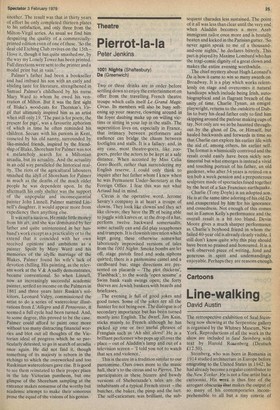Pierrot-la-la
Peter Jenkins
1001 Nights (Shaftesbury) Da (Greenwich) Two or three drinks are in order before settling down to enjoy the entertainment on offer from the travelling French theatre troupe which calls itself Le Grand Magic Circus. Its members will also be busy softening up your reserve, clowning around in the foyer daubing make up on willing victims or sitting in your lap in the stalls. The superstition lives on, especially in France, that intimacy between performers and audience can bridge the chasm between footlights and stalls. It is a fallacy: and, in any case, most theatre-goers, like zoogoers, prefer the actors to be kept at a safe distance. When accosted by Miss Celia Gore-Booth, rather than surrendering my English reserve, I could only think to inquire after her father whom I knew when he was Permanent Under-Secretary at the Foreign Office. I fear this was not what Artaud had in mind.
Circus is the operative word. Jerome Savary's company is at heart a troupe of clowns. They look like clowncand they act like clowns; they have the lir of being able to juggle with knives or, at the drop of a hat, perform twelve backward somersaults; some actually can and did play saxaphones and trumpets. It is clownish invention which kept going these otherwise somewhat laboriously improvised versions of tales from the 1001 Nights. Smoke bombs are let off, stage pistols fired and soda siphons quirted; there is a pantomime camel and a cardboard bus; stage directions are presented on placards — 'The plot thickens', 'Flashback'; to the words 'open sesame' a Swiss bank vault swings open; the forty thieves are Jewish bankers with beards and briefcases.
The evening is full of good jokes and good tunes. Some of the jokes are all the funnier for not being new. The dialogue is of secondary importance but has been turned mostly into English. The dwarf, Jim Kain, sticks mainly to French although he has picked up one or two useful phrases of Franglais such as `Ah shit, alors!' He is a brilliant performer who pops up all over the place — out of Aladdin's lamp and out of a television screen — 'I told you not to watch that sex and violence.'
This is theatre in a tradition similar to our pantomime. Ours owes more to the music hall, their's to the circus and to Pierrot. The participators in these bizarre and bawdy versions of Sheherazade's tales are the inhabitants of a typical French street — the butcher, the baker, the pimp and the tart. The self-caricature was brilliant, the sub sequent charades less sustained. The point of it all was less than clear until the very end when Aladdin becomes a mere Arab immigrant tailor once more and is brutally beaten and kicked in the Parisian gutter. 'So never again speak to me of a thousandand-one nights,' he declares bitterly. This part is played by Maxime Lombard who has the tragi-comic dignity of a great clown and makes the entire evening worthwhile.
The chief mystery about Hugh Leonard's Da is how it came to win so many awards on Broadway. It is a play which works relentlessly on stage and overcomes it natural handicaps which include being Irish, autobiographical and in flagrant breach of the unity of time. Charlie Tynan, an emigre playwright, returns to the outskirts of Dublin to bury his dead father only to find him skipping around the parlour making cups of tay. Not only are we to be haunted throughout by the ghost of Da, or Himself, but hauled backwards and forwards in time so that Charlie can explore his earlier life with the aid of, among others, his earlier self. The format is whimsically contrived and the result could easily have been sickly sentimental but what emerges is instead a vivid and touching portrait of his father, an old gardener, who after 54 years is retired on a ten bob a week pension and a preposterous sculpture made of spectacles fused together by the heat of a San Francisco earthquake.
Charlie (Tony Doyle) is an adopted son. He is at the same time adoring of his old Da and exasperated by him for his ignorance and cussedness. Not enough of this comes out in Eamon Kelly's performance and the overall result is a bit too bland. Devin Moore gives a much sharper performance as Charlie's boyhood friend in whom the failed 40-year old is already clearly visible. I still don't know quite why this play should have been so praised and honoured. It is a well observed piece of writing, fond and generous in spirit and undemandingly enjoyable. Perhaps they are reasons enough.


































 Previous page
Previous page